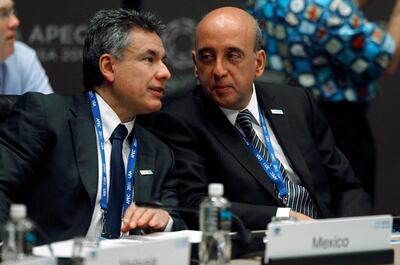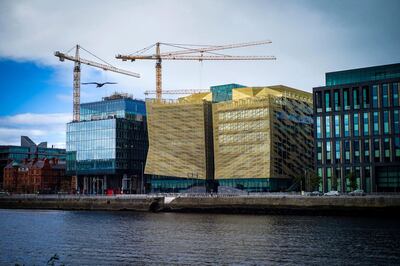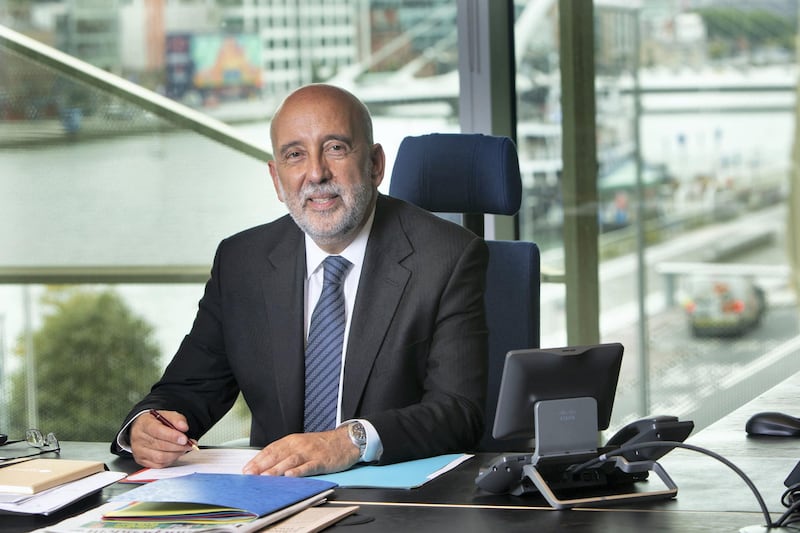As governor of the Central Bank of Ireland, Gabriel Makhlouf is much preoccupied by the issue of resilience in a small, open economy challenged by a year of pandemic.
Mr Makhlouf’s own peripatetic life has shown him how precious an asset the quality of adaptability is at a time of change, be it in a person or for a national economic system.
Upheaval and the Makhloufs on the move could be a theme stretching back to when his father's side of the family travelled across the Mediterranean from their Lebanese homeland to Cyprus.
When the island was part of the Empire, the family became British subjects and Makhlouf Snr ended up working at the embassy in Cairo after the Second World War.
It was in that palatial building near the Nile that he fell for a Greek-Armenian woman whose forebears had fled the historical turmoil of Izmir in 1922. Her family moved to Athens where she has come full circle to live today.
Mr Makhlouf was talking to The National at a time when Ireland's strict national Level 5 lockdown is both defining his job and providing a perspective on the decades of movement and upheaval that have brought him to where he is now.
At a conference last week, the governor spoke of how the outlook had deteriorated in 2021 with the renewed lockdown. The short-term need to bolster the economy coincided with structural changes from technological innovation and climate policies. Ireland suffered a 7.1 per cent slump in domestic demand last year but is expected to see a 2.9 per cent increase in 2021.
Unemployment is predicted to reach 9.3 per cent this year and for an economy with a high level of property-focused debt, ensuring that households are supported is a priority. Mr Makhlouf points out that growth is not the same as having the capacity to recover quickly.
"We cannot anticipate every type of shock but we can build resilience," he said in his keynote address. "Resilience is what has prevented the financial system repeating its previous failure. Resilience is what has protected households, businesses and communities against the worst of the damage from the shock of the pandemic.
"Economic resilience is what helps communities to manage the disruption caused by change and to manage the economic transitions we are living in right now."
In providing leadership during financial strife, it is perhaps a boon to have some sense of dislocation. He describes his mother's family as refugees. His parents met in a milieu that was the product of worlds with roots as far back as the Phoenicians, ancient Greeks, Romans and Egyptians. And yet the people of Mr Makhlouf's parents’ generation made their choices and moved to build new lives.
"My mother, who was born in Athens, had spent most of her life outside of Greece, but when my dad retired she came back," he recalls. "My dad moved on and lived all over the world and settled in Greece at the end, before he passed away.”
Mr Makhlouf was born in Egypt but left at the age of three when his father joined the United Nations and moved to the Congo. Makhlouf pere’s time as an international diplomat exposed the young Gabriel to many cultures.
"My first language was French, because my parents’ mutual tongue was French," he says. "So I learned English when I was about seven when we went to Bangladesh, and when we got to the Pacific we lived in Samoa.
"I went to school in Samoa. My parents then decided they ought to send me to boarding school if I was going to get a proper education and not one that changed every few years."
Travelling during the school holidays from the school in England was a regular odyssey in itself. "The trip to get to Samoa and back to England involved stopping in Los Angeles, Honolulu and Pago Pago, an American territory pronounced 'Pango Pango'," he recalls.
"But then they moved to the Philippines, they moved to Fiji, they were in Ethiopia and they were in Thailand. So, you know, my brother and I got used to this life."
It is a puzzle, then, to establish the appeal to the young Mr Makhlouf of embarking on a career as a Whitehall civil servant. He explains it as following his father’s footsteps in to the bureaucracy. Certainly, the career path was more about determination and making opportunities than wanderlust.
"I don’t think I joined the civil service for stability, to be honest, but maybe somewhere deep inside me there might have been that," he says. "I joined the civil service really for interest. I joined as a tax inspector at the beginning. And it was an interesting career option – it involved law, it involved accountancy and it gave early opportunity to manage."

Fate intervened to resume the family’s roving tradition when Mr Makhlouf was headhunted in 2010 to run New Zealand's finance ministry, the Treasury. There, he was responsible for developing a measure of wellbeing as a replacement for the traditional gross domestic product yardstick.
In one memorable allusion in a speech he compared the role of an economist to that of an artisan, challenged with weaving together different strands of evidence into a structured framework.
Before upping sticks to the southern hemisphere, Mr Makhlouf at one point worked directly with then-UK chancellor Gordon Brown, who became prime minister at the time of the global financial crisis in 2008.
Asked about his former boss and a recent warning that the world now faces another lost decade or perhaps even worse than after that crash, Mr Makhlouf acknowledges how bad it was last time around but disagreed on the dangers now.
"I think that there is one massive difference between the crisis in 2008 and today’s crisis," he says. "Which is that the crisis in 2008 was a crisis of the financial system, the financial system basically collapsed.
"Today, the financial system is still standing, and it's the financial system that’s playing a very important role in supporting businesses and households through the pandemic and hopefully into a recovery and out the other end."
World leaders are proving to be different kinds of players, having recognised that this is an economic crisis caused by a health crisis. "Governments throughout the world have chosen to close down economies for the sake of people’s health. In some respects that is been planned. In comparison to what happened in 2008 where actually events completely overwhelmed us."
So Mr Brown's fears are too pessimistic? "A lot of the changes and challenges that are ahead of us, I think if we manage them, then I think they can be managed well," he says.
Mr Makhlouf takes heart from the rapid adjustment of businesses to home-working and new patterns of demand. "Economies across the world and certainly in the industrialised world have adapted to the restrictions," he says. "More businesses are set up for that and more consumers were ready and knew how to proceed.”
The scale of "technological adaptation" since he accepted the Irish job in 2019 is something he could well have guessed was just around the corner.
The governor has not been immune to the extraordinary pressures imposed by lockdowns. Even at the outset of the pandemic, the family's far-flung ways isolated him in Athens just as the 2,000-strong staff of the central bank in Dublin were forced to work from home.
With his mother ill in hospital, Mr Makhlouf was on hand to help her recover. "Effectively, I carried on working like everyone else via laptops and iPads. It's quite an extraordinary thing that we all seem to have got used to."
History means that a British citizen running the Irish central bank will always be a talking point. The moment that the UK left the EU put Mr Makhlouf in an invidious spot.
First, there is migration of businesses and banking activity from the City of London to Dublin so that firms remain within the EU umbrella. Is this an opportunity?
"Overall, I think the impact of Brexit is negative. It's negative for Ireland and for the UK and for the EU,” he says. “We're most exposed as a country in the agricultural sector, in particular. The fact that there was, at the end of the day, a deal albeit a very slim deal was better than there being no deal.
"On financial services, we have seen post-referendum a move of business from London to Dublin," he agrees. "I’m not sure I would necessarily call it an opportunity at all. I think from my perspective as a regulator this increases the need for us to manage and ensure the financial system works properly."

With his son, brother and wife's relatives living in London, the governor observes that the pandemic has played a greater role than Brexit in cutting off families and friends. But things are different.
"I feel sorry for someone like my son -- his opportunities to work in 27 other countries have now been limited. So his generation has lost out," he says. "Ireland and Irish people have got many connections in the UK, we recognise Brexit has happened but those connections haven’t disappeared, they haven’t been lost."
As two movie-perfect countries on the periphery of continents with roughly similar populations, one wonders what the biggest change is for Mr Makhlouf in switching from New Zealand to Ireland.
There is the remoteness of the former compared with the latter’s position within the wealthy European market. But the answer, he feels, is the perspective on China. In New Zealand, much time was spent thinking about and visiting that part of east Asia. He himself went at least nine times.
"The role that Asia has been playing and will play in the 21st century usually dominated a lot of thinking. And what's interesting coming back to Europe, and perhaps now it's not surprising at one level, but it was noticeable how little of our time was spent thinking about Asia.”
For the well-travelled, there is the unchanging truth that proximity is often the most powerful force in geography.









